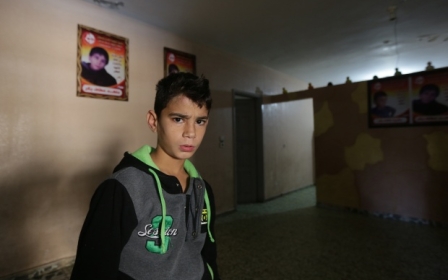The sadness of Gaza's Swedish village

It stinks here in southern Rafah, quite literally. The smell of raw spilled sewage pervades the senses making an already difficult life even more unpleasant. Life is a struggle every hour of every day for the old men, women and children in this village who are trying to care for the place they have adopted as home.
But these homes are not like any other homes in Gaza. They are extremely small, make-shift dwellings, made out of whatever is at hand, be it cardboard, hanging sheets or branches from palm trees. There is little to no privacy and the fragile structures cannot withstand the cold forces of winter storms or summer heat.
The area is known as the Swedish Village, named after the Scandinavian soldiers who once served here while on a UN peacekeeping mission.
“Death is better than this life,” says 55-year-old Umm Musher Ashour, while cleaning out what smells like fresh sewage pouring into her living room after the fragile infrastructure of her home collapsed under the pressure of the fouled sea water.
But it’s not only her husband who is ill. In the same village, Rafat Hassouna, 42-years-old and father to five children, says that the poverty, inadequate housing and raw sewage pouring into the sea nearby means that most children become sick from eating contaminated fish from polluted waters.
The village is underdeveloped, not only because of Israel’s current blockade but because the area, even before 2005 when Hamas took over, was an isolated zone under the control of the Israeli occupation and its Jewish-only settlers, leaving the 800 Palestinian residents of the village closed in with restrictions on mobility.
Ali Abu Owda is the elected representative of the village and the oldest man at 80-years-old. He shares with MEE the story of his village since it was established in 1965 when Palestinians were pushed out of their traditional homes.
“We were living in homes made out of mud, but heavy winter storms destroyed everything and forced us to shelter in schools in 1965,” he says.
The village was built, with the help of the Swedish and other international troops, and eventually grew to contain more than 800 local residents.
“We survive on fishing but that is now heavily restricted. Our fishermen are chased and attacked by Israeli and Egyptian warships on a regular basis,” he says, making earning a living extremely difficult and dangerous.
“Our children always need hospital care. On average, I would estimate that I take one of my children to hospital at least once a week for different reasons, from scabies to severe stomach pains,” he says.
Infertility seems to be a major problem too. Hassouna says 12 young people were married in one year in the village, and all were trying to start a family, yet none of them were able to have children. Residents are scared and want some scientific research done to examine the impact of sewage in the local water and the fish they consume, as well as investigations into their seeming inability to have children, and other general family health concerns.
The summer season is much worse. As the heat increases, bacteria spreads and the smell of raw sewage in the nearby Mediterranean Sea is overpowering.
The sewage pipe to the sea was destroyed and now pollution leaks onto nearby agricultural land and into the main fresh-water aquifer. This area is the childrens' only playground.
Hassouna says that only seven people in the village are officially working for the Palestinian Authority. The rest are unemployed, including fishermen and their wives and children, who have to live in one or two rooms for each family.
“I am a fisherman and I can’t find food to feed my family,” says 54-year-old Kamel Abu Owda, father of seven children, two of whom are married.
He says the sea is under blockade and he can’t even venture out into areas already known to be depleted of fish. In the past, whatever fish he managed to catch, he swaps for basic chicken - a dream meal for his children.
Most areas in the Gaza Strip suffer from a shortage of water, but the Swedish village suffers particularly badly as the water coming into people’s homes is salty, polluted, undrinkable and a major health hazard.
Opposite the home of Umm Musher Ashour, there are two Palestinian soldiers patrolling on the borderline, and another group of soldiers on a watchtower overlooking Egypt.
Umm Musher takes MEE on a tour through her home. She describes life as extremely difficult, explaining that when her home is flooded with sewage, she is left in limbo, unable to do much of anything.
“It costs us 100 shekels (NIS) every three weeks to empty sewage out of the well,” she says, and there is no income apart from the aid provided by UN agencies.
Umm Musher’s home accommodates 20 family members, including her children and grandchildren, who are regularly sick due to a lack of clean drinking water and poor diet.
She shows MEE into a small simple kitchen. There is no food, apart from a few pieces of onions hanging in a plastic bag mounted on the wall.
Stay informed with MEE's newsletters
Sign up to get the latest alerts, insights and analysis, starting with Turkey Unpacked
Middle East Eye delivers independent and unrivalled coverage and analysis of the Middle East, North Africa and beyond. To learn more about republishing this content and the associated fees, please fill out this form. More about MEE can be found here.






